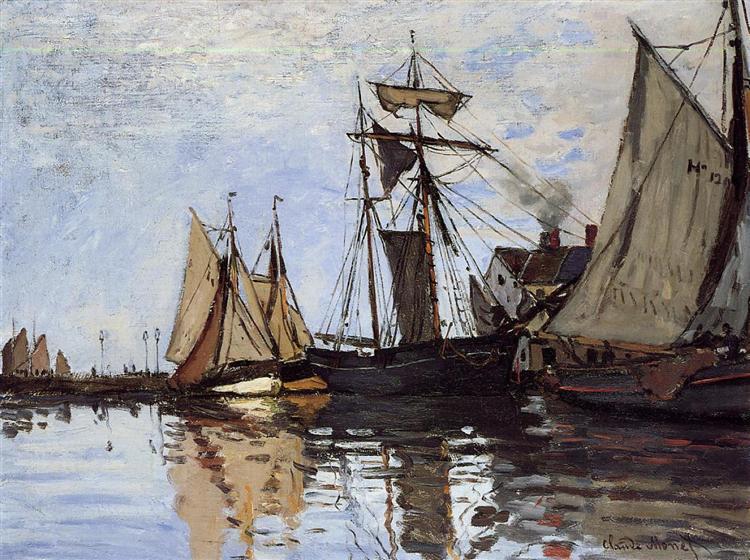תיאור
In "Boats in the Port of Honfleur" from 1866, Claude Monet offers us a fascinating glimpse of port life, masterfully illustrating his emerging Impressionist style. The work captures an ephemeral moment as boats rest in the harbor, surrounded by the painter's signature mood of light and color. Monet, a pioneer of the Impressionist movement, achieves in this painting a remarkable interplay between form and light, a distinctive trait that would set him apart from his predecessors.
The composition of the work is arranged so that the viewer is immediately drawn into the calm water of the harbour, where the boats, arranged at a multiplicity of angles, create a sense of movement and life. The vessels, with their masts rising against the sky, invite contemplation and suggest stories of past voyages. The use of loose brushwork allows the boats to blend almost organically with the gentle ripples of the water; Monet thereby achieves a representation that is both concrete and abstract, offering a rich visual experience where the real and the suggested are intertwined.
The colour palette he uses is characteristic of his style; the blue and green tones of the water contrast beautifully with the warmer reflections of the sails and wood of the boats. Monet employs a variety of tones and shades that vary from the cloudy skies to the subtle reflections on the water's surface, thus manifesting the changing qualities of natural light. Through this technique, the artist manages to convey not only the visual aspect of the setting, but also its atmosphere and emotion. The sky, covered with shadows and lights, is reflected in the water, creating a visual dialogue that breathes vitality.
Although there are no prominent human figures in the painting, the implied presence of port life is fully felt. The absence of visible characters suggests a moment of stillness before the activity of shipping comes alive again, allowing the viewer to project their own narrative onto the scene. Each anchored ship can tell us stories of those who have departed and returned, posing a sense of longing and nostalgia that permeates the work.
This work delves into Monet's approach to nature and the environment that surrounded him, a recurring theme in his career. The choice of Honfleur as a setting aligns with his interest in landscapes that, while moving and beautiful, are presented with a sense of transience that is a distinctive feature of Impressionism. Monet, through his work, invites us to reflect on the relationship between man and the sea, as well as the interaction between art and perceptual experience.
“Boats in the Port of Honfleur” not only stands as a testament to Monet’s talent but also as a turning point in the path of Impressionism. By capturing a scene of apparent simplicity with such depth and nuance, the painting becomes a catalyst for dialogue about time, memory and the very essence of everyday life. This work is a reminder that beauty can be found in the everyday and that through artistic perception, we can explore the complexities of the world around us.
KUADROS ©, a famous painting on your wall.
Hand-made oil painting reproductions, with the quality of professional artists and the distinctive seal of KUADROS ©.
Painting reproduction service with satisfaction guarantee. If you are not completely satisfied with the replica of your painting, we will refund 100% of your money.

